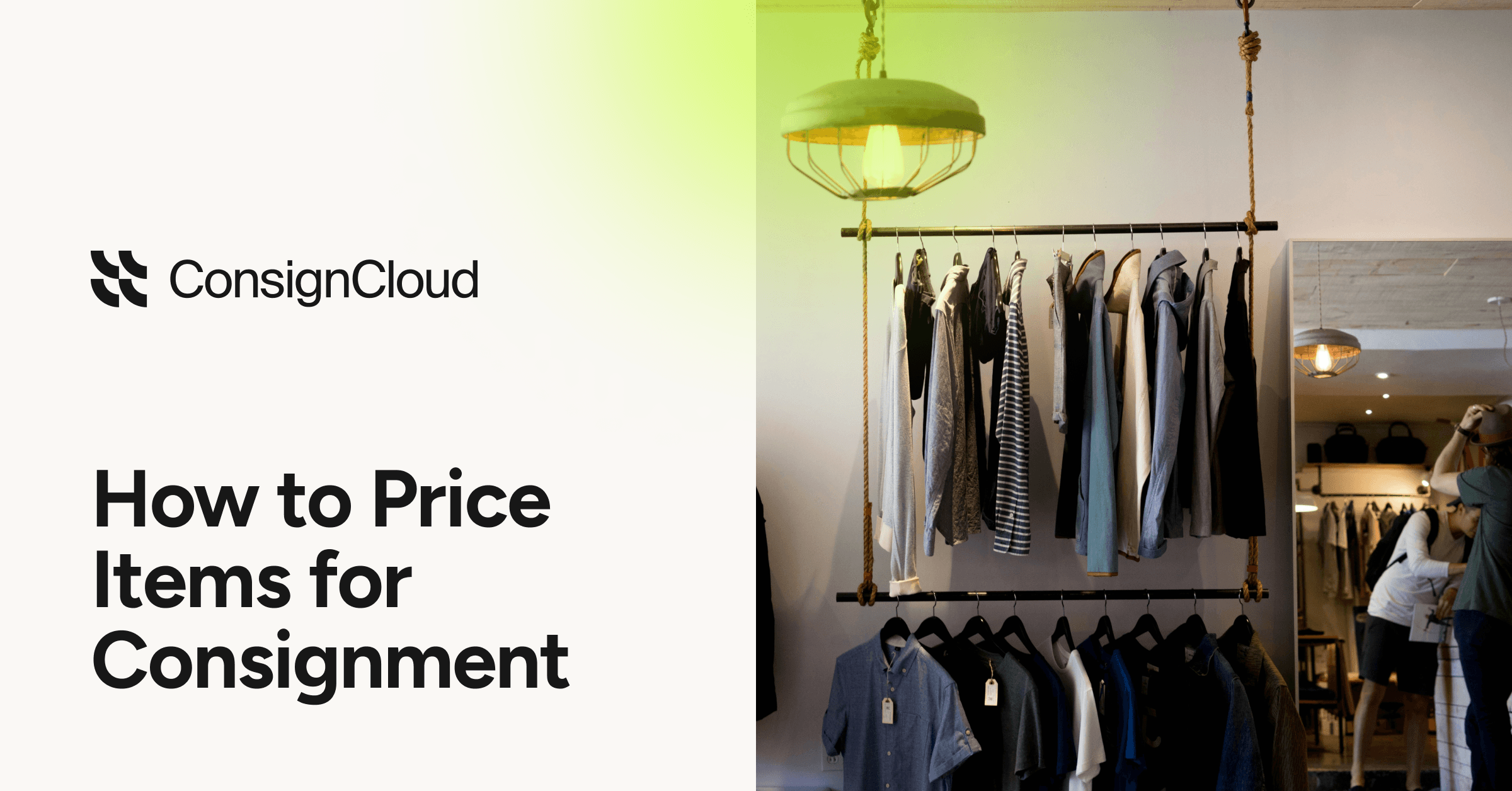8 Mission-Critical Consignment Business Costs

Jon Staab
Aug 30, 2022
Cost is one of the most fundamental aspects of every consignment business. Your costs dictate the up-front funding you need in order to launch, the prices you charge, and the monthly revenue needed to stay profitable. So it shouldn't surprise you that if you miscalculate your expenses, you may need to:
Cut budget items
Scale down operations
Reduce prices
Temporarily or permanently close
None of these outcomes are ideal, to say the least. To help you avoid them, we created the Consignment Business Cost Calculator (you'll find it at the end of this article). By filling in each applicable field in the calculator with the relevant dollar amount of that expense, you'll be able to approximate your monthly costs and accurately plan your budget around them.
The costs of doing business
Calculating your business costs ensures that you don't encounter unexpected expenses.
Before delving into each of the line items covered by the calculator, we need to make a couple of important notes. First, the calculator accounts for both variable costs and fixed costs. Variable costs vary from month to month, like consignor payouts and card processing fees. Fixed costs are static and include line items like flat fee software subscriptions and building leases. While you can predict your fixed costs with a high degree of accuracy, your predicted variable costs are estimations. Once you launch your business, you will see whether your actual variable costs align with your predictions and can adjust your budget accordingly.
Second, the calculator doesn't account for every possible expense. Write down any additional costs and organize them into 1) regular expenses and 2) irregular expenses. Regular expenses include items like additional insurance, and landscaping, which you can add to your costs in the calculator under "Monthly Expense." Irregular expenses include things like electrical and plumbing calls and should be paid for with some kind of business savings account. Set aside 5% to 10% of each month's revenue, and you should be able to cover the most common irregular expenses. For larger unforeseen expenses, you can also take out a business loan.
How to use the calculator
Below, we've outlined the costs included in the Consignment Business Cost Calculator. We've also explained why each one is important and made recommendations for optimizing that particular element of your business.
If you don't already know your costs or have them written down, we recommend reading through the entire article first. Then, you should take a few hours to research and estimate the cost of each element listed below, which you can then paste into the calculator.
Sales tax
Sales tax varies from state to state, but it generally falls between 4% and 7%, with an average of about 5%. Delaware, New Hampshire, Montana, Oregon, and Alaska have no sales taxes, so if you're in one of those states, you have one less expense to worry about. To find out your state's current sales tax, check out your state government's business site. For an overview of sales tax rates across the country, you can check out this article.
Location lease
Your location lease will be one of your biggest fixed expenses (unless you run an online-only store). This is partially because it's not cheap to lease a building and partially because your lessor will likely require you to purchase insurance before signing the lease agreement (more on insurance below).
Your building location also affects your lease amount. You should carefully plan where you want to locate your store, as different locations offer different advantages. For example, a downtown location will put a bigger dent in your funds, but it will also provide greater access to foot traffic, especially from tourists. Check out this article for insights into choosing your business location.
Business owner's policy
A business owner's policy (or BOP) is a combination of business general liability insurance and business property insurance. General liability insurance protects your business assets from lawsuits in the event that a customer is injured on premises, an item you sold damages property, or an item hurts a customer after they purchase it. Property insurance protects your property against theft, damage, and destruction. In the event of a catastrophic destruction of your property (like a fire), property insurance can also cover certain basic costs like lease payments and payroll while your property is being repaired or replaced.
A business owner's policy should be high on your list of priorities when setting up your business. You don't want to have to pay claims or cover damage to your property out of pocket, especially when you're first getting your store launched. Look into local providers or talk to your current
provider to see what kinds of business policies they offer.
Worker's compensation insurance
Worker's compensation insurance protects both employers and employees in case an employee becomes sick, gets injured, or otherwise becomes incapable of performing their job due to a work-related incident. Generally speaking, worker's comp covers missed wages, medical expenses, rehab, and death benefits for your employees.
To cash in on their worker's comp benefits, though, employees must give up their right to sue the employer for their injuries or illness, which by itself would be a great reason to get worker's comp. It just so happens, though, that it's also required by the federal government for all businesses with employees, so you won't even be able to open your doors before getting this insurance.
Payroll
If you have employees, payroll is going to comprise up to two-thirds of your monthly expenses. Early on, you might not have as many employees as you will after you've scaled up, but you should be prepared to pay thousands (or tens of thousands) of dollars every month to your employees.
Payroll is also affected by how much you pay per hour. Because of the variance in minimum wage policies across the country, your hourly rate could be as low as $7.25/hour and as high as $15/ hour. If the cost of living in your area is particularly high, you may need to pay even more than that to attract workers. Calculate how much you'll pay per hour, how many employees you'll have, and how many hours you expect your employees will work each month, and then you can estimate your monthly payroll. Don't forget to pay yourself too! A business that doesn't yield anything for its founder isn't a business, it's an expensive hobby.
Payment processing

There are plenty of payment processing platforms available that are easy to implement and use.
No business is complete without a method for accepting and processing payments. For obvious reasons, this is one of the most important pieces of hardware or software that you'll use on a daily basis.
Just like consignment software platforms, processing platforms charge on either fixed or variable cost models for basic access to the software. They also typically charge a percentage for each debit or credit sale processed—a small percentage, sure, but over the course of a business day, they'll add up to significant amounts of money. So it's crucial to account for each fee your payment processing platform charges.
Payout processing
The payout system is one of the defining features of consignment. When a consigned item sells, you have to log the sale amount so you can pay the consignor correctly. Payouts are based on the percentage split applied to each item, and different item categories typically have different percentage splits.
Generally speaking, there are four item categories that can be taken on consignment: clothing, home goods, furniture, and art and collectibles. Smaller items, like lower-value clothes and cheaper collectibles, are often taken in on a 40-60 split, where you take 40% of the sale amount and the consignor takes the rest. Larger items like couches, though, demand a lot more work from you in terms of storing and displaying, so some business owners take 50% to 60% on them after they've been sold.
Calculating your consignors' payouts lets you predict accurate post-sales revenue. If you don't account for them ahead of time, you may forget about them as a line item and have to re-work your budget after launching (which is a headache you don't want to deal with).
Software subscriptions
Consignment software should be an integral part of any business that processes more than 200 items per month. The purpose of software is to automate and streamline otherwise time-consuming tasks, such as:
Processing consignor payouts
Notifying consignors of item updates
Tracking inventory changes across multiple platforms
Applying policy rules to different items
Depending on the provider you choose, your software will be either a fixed cost or variable cost. Some platforms charge based on usage, increasing your monthly payment for every additional user or location, while others charge a flat fee, regardless of the number of users or locations. For tips on choosing the best consignment software for your business, check out this article.
You'll also need to integrate your consignment software with bookkeeping software, payment processing software, webstore platforms, printers, barcode scanners, and phones or mobile devices to perform other key business tasks. At first glance, these may seem like small expenses, but the costs will add up---$50 a month here, $100 there, and before you know it, you're spending up to $1,000 monthly on everything you need. Write down each of the software subscriptions you need to integrate with your consignment software, and enter their monthly costs individually into the calculator under "Subscriptions."
As a side note, not every software platform or piece of hardware integrates with everything else you need. It's worth researching what platforms and hardware integrate with each other so you don't waste money by purchasing the wrong ones.
Summary
Once you've run all the numbers and have an estimation of your monthly business costs, you'll have a target dollar amount to shoot for in order to become profitable. Like we said, this calculator isn't comprehensive: there are other taxes and expenses that you'll inevitably have to pay. But the line items described in this article will let you lay a budgetary foundation you can use to benchmark sales performance and revenue figures.
In this post




